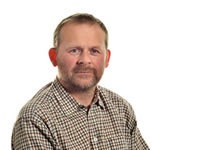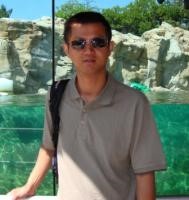Professor Pieter van West

In 1998 he started a postdoctoral position in the College of Life Sciences and Medicine at the University of Aberdeen. Two years later he was awarded a Royal Society University Research Fellowship to investigate fundamental molecular processes in oomycete pathogens. In 2012 he was given a Chair in Mycology at the University of Aberdeen. He is President Elect of the British Mycological Society.
His laboratory investigates most aspects of the biology of oomycetes, often referred to as "water moulds". These are fungal-like organisms that can cause economically and environmentally important diseases. Water moulds can infect animals, plants, algae and fungi.
The animal pathogenic oomycetes under investigation are Saprolegnia spp., Aphanomyces spp. and Halioticida spp., which are important pathogens in the aquaculture industry. The algal pathogens include Olpidiopsis spp., Eurychasma dicksonii, Anisolpidium spp. and Maulinia.
Professor Chris Secombes

In 2003 he established the Scottish Fish Immunology Research Centre, and has been instrumental in securing its position as global leader for fish health research.
In 2001 he became head of the Zoology Department, and then Head of the School of Biological Sciences, a position he held for 9 years. In 2004 he was appointed to the Established Chair of Zoology at Aberdeen, and in 2014 to the Regius Chair of Natural History. He is a Past President of the International Society of Developmental and Comparative Immunology, and in 2013 was given Honorary life membership of the International Society of Fish & Shellfish Immunology.
In 1998 he was elected a Fellow of the Royal Society of Biology, and in 2007 elected a Fellow of the Royal Society of Edinburgh (RSE). In the same year he was awarded the RSE Alexander Ninian Bruce prize for "his outstanding contribution to our understanding of the immune system of fish, particularly salmonids". In 2014 he was awarded an Honorary DSc from the University of Hull. He is Editor of his subject journal of Fish & Shellfish Immunology and on the editorial boards of Veterinary Immunology & Immunopathology, and Molecular Immunology.
Professor Sam Martin

During a response to pathogens energy is reallocated from fat and protein reserves by complex interactions between cytokines and growth promoting factors, allowing for production of immune molecules to fight the infection.
Sam's group has taken both in vivo and in vitro approaches to explore these processes, focussing on muscle (as key protein reserve) and immune organs including kidney and liver. Recent years have seen dramatic changes in the composition of diets for carnivorous fish with higher levels of plant protein sand oils replacing wild sourced fish meal and fish oils. The impact these new diets have on intestinal function and immune response are unknown.
Other ICARD Members
Dr Alan Bowman

Sea lice use semiochemicals ("smells") emanating from their preferred host for host location. Conversely, the lice use semiochemicals from non-host fish species to avoid locating and settling on inappropriate hosts. Funded by three industrial partners, our lab investigates the feasibility of moving semiochemical control approaches from the lab to the field.
Professor Baukje de Roos

Baukje de Roos is a principal investigator at the University of Aberdeen, Rowett Institute of Nutrition and Health, investigating mechanisms through which dietary fats and fatty acids and polyphenols affect parameters involved in the development of heart disease in vivo. This is achieved not only by measuring their effect on validated risk markers for heart disease but also by assessing their effect on new risk markers that are currently being developed through proteomics and mass spectrometry methods.
A recent publication reported on 'The potential impact of compositional changes in farmed fish on its health-giving properties: is it time to reconsider current dietary recommendations?'.
Dr Alex Douglas

A recent paper reported the effects of algal enrichment and salinity on sediment particle reworking activity and associated nutrient generation mediated by the intertidal polychaete Hediste diversicolor.
A previous collaborative BBSRC-NERC grant looked at Gut health and immune function: the emerging role of gut microbiota in sustainable aquaculture.
Professor Jorg Feldman

Jörg Feldmann's research interests concern the interaction of trace elements in the environment and biota using novel speciation methodologies and elemental bioimaging. The focus of his work is on arsenic speciation in soil/plant as well as in the marine environment. Some current projects are - Arsenic speciation in food (eg. seafood) using HPLC-ICPMS and affordable methods such as HPLC-HG-AFS, field kits- Inorganic arsenic in seaweed (analytical chemistry and environmental studies) and - Arsenolipids in marine samples (stranded pilot whales, seaweed): the analysis, the occurrence and the origin of arsenic containing lipids.
Dr Hai Deng

Professor Frithjof Kuepper

His research interests are in the biochemistry and biodiversity of marine algae and microbes. His current research is on Oomycete pathogens of marine algae; iodine and defence metabolism in marine brown algae; trace metal uptake and storage in marine algae and the biodiversity and taxonomy of marine brown algae.
Dr Petra Louis

She took up a post-doctoral position at the University of Aberdeen in 1998 to work on stress responses in Escherichia coli, supported by the Wellcome Trust and an EU Marie Curie post-doctoral fellowship. This was followed by research on RNA secondary structure melting during translation in yeast funded by the Wellcome Trust.
Since February 2002, Petra has held a position as principal investigator at the Rowett Institute in Aberdeen. Her research concentrates on the activities of the microbial community that inhabits the human intestine and how it can be modulated by diet to improve human health. She utilises are wide range of technical approaches, including strictly anaerobic microbiology of pure strains and mixed microbial consortia, molecular microbial community analysis, genomics, metagenomics and proteomics, and she has recently started to apply her expertise to fish gut microbiota during collaborative work with Professor Sam Martin.
Professor David Lusseau

We blend new statistical and mathematical modelling developments with unique data collection approaches to achieve these goals. While you can most often find us in front of a white board or coding new programmes on a computer, we also spend time collecting data too in the field and the lab using all sorts of new approaches with a focus on automation.
Professor Vladimir Nikora

Vladimir Nikora's current research interests relate to fluvial hydraulics (sediment transport, turbulence, flow resistance, mixing), eco-hydraulics (flow-biota interactions at multiple scales, ecologically relevant transport processes, vegetated channels, surface-subsurface flow interactions, benthic boundary layers), and fundamental issues of rough-bed flow hydrodynamics.
Professor Stuart Piertney

Next generation 'omics technologies and high throughput DNA sequencing is used to gain a more holistic understanding of adaptation and genomic response to environmental and ecological change.
A lot of current effort is focussed on marine invertebrate species, with a focus on understanding speciation genomics in intertidal isopods, adaptation in deep-ocean amphipods, and characterising deep-sea communities using metagenomics.
Dr Alan Sneddon

He has been involved in investigating the effects of seasonality and location on fish, shellfish and seaweed nutrient, micronutrient and heavy metal content and has also carried out human intervention studies to examine the effect of regular shellfish/salmon consumption on modulating nutrient/heavy metal status and promoting health.
Dr Jeremy Sternberg

The use of an untargeted global metabolic profiling approach for the discovery of novel candidate stage-diagnostic markers in infection using 1H nuclear magnetic resonance (NMR) spectroscopy can potentially be adapted for metabolic profiling within the aquaculture setting for early disease diagnosis.
Professor Norval Strachan

One of Norval's research areas is image analysis and pattern recognition techniques applied to fisheries and environmental sciences.
Dr David Stead
David Stead is a Senior Research Fellow at the Aberdeen Proteomics, Rowett Institute of Nutrition and Health. One of the research projects David has been involved in is in the effect of a single meal on the postprandial expression of hepatic proteins in fish which has shown that temporal changes occur in the trout liver proteome. The aim is to develop a better understanding of the molecular mechanisms controlling nutrient utilization to be able to generate sustainable and functional diets and improve the efficiency of aquaculture.
Aberdeen Proteomics provides protein analytical services to the academic and industrial research communities, from one-off protein identifications to quantitative proteomics studies for a wide range of organisms and sample types, including clinical, animal, plant, microbial and viral samples.
Professor Ioannis Theodossiou
Ioannis Theodossiou holds a chair in Economics at the University of Aberdeen. He has published a number of working and discussion papers on various factors in economics.
Professor Graham Pierce
Graham Pierce is an Honorary Research Fellow whose research interests include predator (e.g. seal) impacts on cultured fish and the biological and socioeconomic interactions between aquaculture and fisheries.
